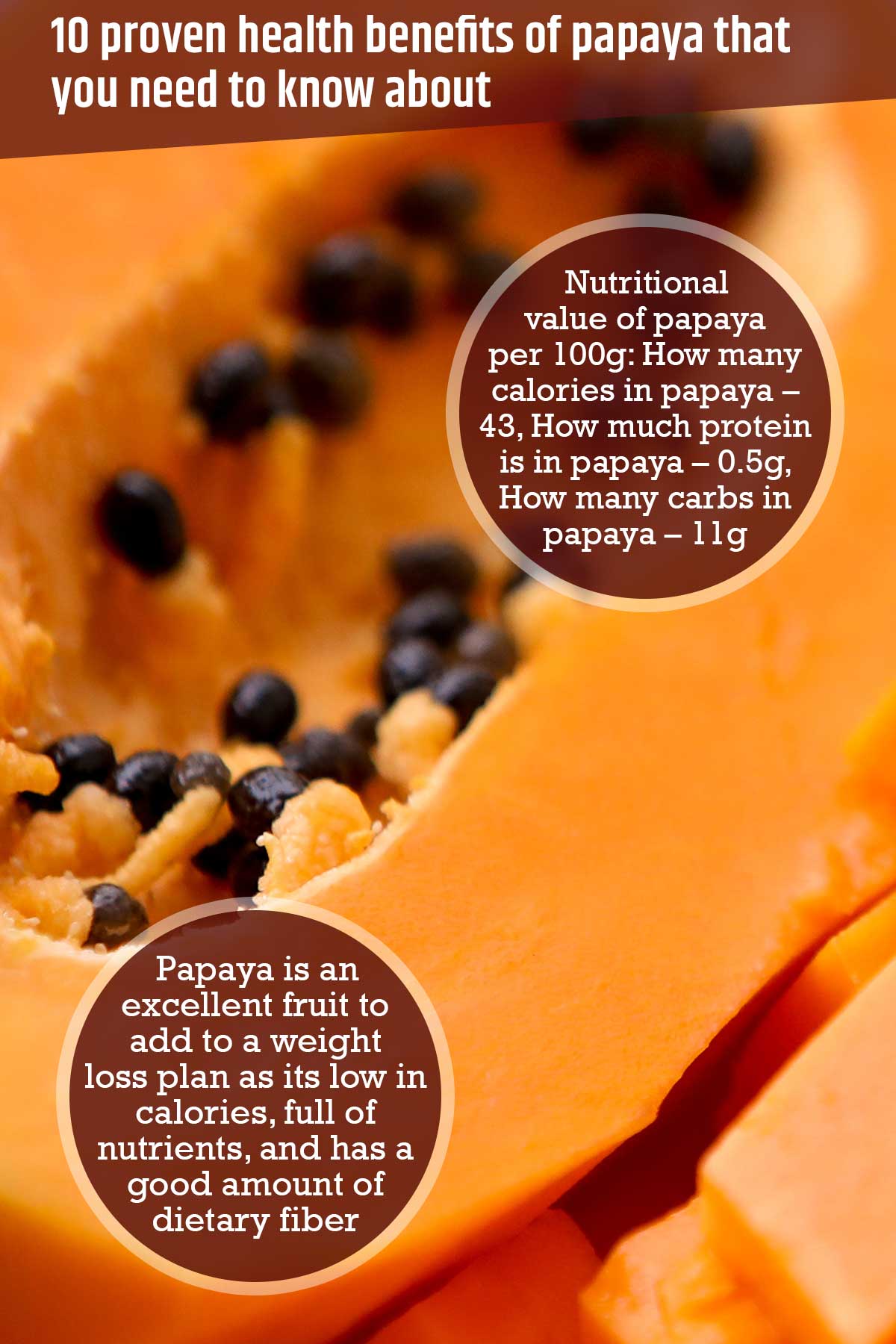Nutrients in papaya
Papayas are a fantastic source of antioxidant nutrients like vitamin C, carotenes and flavonoids. One half of a small papaya provides 150 percent of the daily value of vitamin C.
Papayas are also a good source of folic acid, vitamins E and A, potassium, and dietary fiber.
Nutritional value of papaya per 100g:
- How many calories in papaya – 43
- How much protein is in papaya – 0.5g
- How many carbs in papaya – 11g
- What is the fat content of papaya – 0.3g
1 – Is papaya good for weight loss?
Papaya is an excellent fruit to add to a weight loss plan as its low in calories, full of nutrients, and has a good amount of dietary fiber.
The dietary fiber will help control cravings and promote a feeling of fullness.
2 – Is papaya good for digestion?
Papayas contain the protein-digesting enzyme papain. Papain breaks down protein fibers and can help with digestion. Papain is more concentrated in papaya when it’s unripe.
Papain is used in digestive enzyme supplements as well an ingredient in many meat tenderizers. Papain is also used to treat a number of conditions, such as indigestion and chronic diarrhea.
3 – Is papaya good for cancer?
Research has shown that beta carotene rich papaya protects against prostate cancer and colon cancer growth.
Research has also shown that a diet rich in lycopene containing foods can help reduce prostate cancer risk as well as other cancers.1✅ JOURNAL REFERENCE
PMID: 25526570
4 – Is papaya good for cholesterol?
Papayas are a good source of lycopene. Lycopene is an antioxidant that helps prevent cholesterol from oxidizing. Oxidized cholesterol contributes to the narrowing of arteries. The LDL cholesterol circulating in the blood is prone to oxidation.
There is only 1828 micrograms of lycopene in 100 grams of papaya as opposed to 3041 micrograms in 100 grams of cooked tomato. But the lycopene in papaya is more bioavailable from papaya than from tomato.
5 – Is papaya good for hair?
Although there is no scientific proof, a papaya rich diet is claimed to help with thinning hair.
There are also many hair products available that contain papaya extracts and a quick search will give a variety of papaya hair paste recipes.
6 – Is papaya good for stroke?
Higher serum concentrations of lycopene are associated with reduced risk of ischemic stroke and any other kind of stroke.
Papaya also contains a substance called fibrin which helps to improve blood flow and reduce clotting. Clogged arteries can increase risk of strokes and heart attacks.
7 – Is papaya good for wounds?
Mashed papaya applied to burns and wounds can promote healing and prevents infection.
Russian scientists have found that the antioxidants and natural enzymes in papaya can speed up the healing of burns and wounds.2✅ JOURNAL REFERENCE
PMID: 19041705
Papaya contains Vitamin C, Vitamin E and beta-carotene. All these antioxidants contribute to inflammation reduction.
Rats treated with papaya-based medicine had wounds that were half the size of those not given the treatment.
8 – Is papaya good for the eyes?
Phytochemicals present in papaya can help maintain better eyesight longer in older people. These phytochemicals can help to prevent age related macular degeneration.
Lutein and zeaxanthin are carotenoids that filter harmful high-energy blue wavelengths of light.3✅ JOURNAL REFERENCE
PMID: 21899805 These carotenoids help protect and maintain healthy cells.
9 – Is papaya good for HPV?
Papaya is a rich source of the nutrients lutein, zeaxanthin, beta-cryptoxanthin and vitamin C.
According to a study, an increased intake of these nutrients lowers HPV infection rates, the cervical cancer papillomavirus.4✅ JOURNAL REFERENCE
DOI: 10.1086/379197
Women who consumed at least one papaya or more per week had lower risk of contracting the HPV infection than those who didn’t.
10 – Is papaya good for intestinal parasites?
A study has shown that the papaya fruit as well as the seeds have anti-parasitic activity.
For the study, dried papaya seeds were given to children who had intestinal parasites. The children had no parasites after 7 days.
History of papaya
The papaya is thought to have originated in southern Mexico and Central America. Portuguese and Spanish explorers took papayas throughout Central America. They then took them to other subtropical lands, including the Philippines, India, and parts of Africa.
Papayas were brought to the US In the twentieth century. They have since then been grown in Hawaii. Today, the largest commercial producers of papayas include the United States, Mexico, and Puerto Rico.



